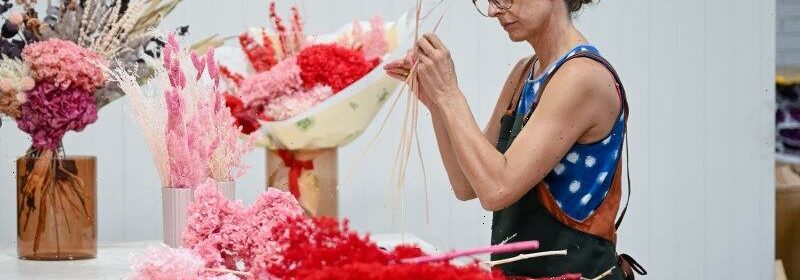The flowers taking over from roses this Valentine’s Day

In an age when sustainability and cost-of-living pressures are top of mind, demand for the Valentine’s Day rose is wilting.
Instead, not wanting to ditch flowers altogether, many couples are taking a different route by offering each other dried or preserved flowers and fresh native bunches.
Everbloome’s Tracey McPherson prepares flowers for Valentine’s Day.Credit:Joe Armao
Elleni Pearce has been selling dried bouquets – made from natural flowers that have been preserved – since launching her Melbourne-based online business, Everbloome, in 2020 when the trend was taking off.
Despite not selling any roses, Valentine’s Day is one of her key annual dates. This year, she has already seen a 50 per cent growth in sales compared to this time last year.
“It was probably still an early adopter thing last year, but it’s now more popular and readily known,” Pearce said.
A dozen fresh red roses typically sets you back about $150, whereas preserved flowers that cost a similar amount could sit in a vase for up to seven years.
“It’s something that actually will last, so it’s a keepsake that almost transcends into homewares,” Pearce said.
A Finder survey of 1052 Australians found that only one-third plan to celebrate Valentine’s Day this year, but those marking the occasion will spend an average $210.
Pearce’s Valentine’s Day collection is in tones of red and pink, ranging between $89 and $249, with hydrangeas proving particularly popular.
“Red can be a bit jarring sometimes … so we have those deeper, punchier reds but also softer, feminine palettes.”
But people aren’t just sticking to the traditional colours of love. Pearce estimates that half of her Valentine’s Day sales are on her regular bunches, which can come in shades of white, blue and green.
Harvest Botanica’s “Blush with Love” dried bouquet.
“They’re choosing something their partner is actually going to really appreciate,” she said.
As Valentine’s Day is increasingly seen as a cliched, consumerist and wasteful day, teddy bears and balloons have also fallen out of favour.
“I just think we’ve become more sophisticated and [environmentally] mindful as consumers,” Pearce said.
Kerryn Miller said her online florist, Harvest Botanica, was having its biggest year yet for Valentine’s Day preserved flowers, making up about 60 per cent of her bouquet sales.
“With inflation, people are thinking outside the box,” Miller said. “People who are organised and know how expensive roses are seem to be going for dried flowers.”
Preston-based Miller sells red roses, but with all the mark-ups from suppliers at this time of year, even she sees them as “a rip-off”, and her customers aren’t very interested in buying them.
Instead, natives and pink arrangements were in demand, she said, as were her $60 dried posies that come with a soy candle.
“They’ll last three years as opposed to three days, like roses do. It can be a bit more meaningful in a way,” she said.
“If you’re not really into Valentine’s Day but you want to give something because you’re out to dinner, it’s a nice touch.”
Florist Silvi Ropi specialises in fresh flowers at her Kensington shop, Elysee Flowers, and said only about one in 10 of her Valentine’s Day orders were for preserved bouquets.
While red roses are selling, she said natives such as proteas and banksias were hugely popular.
“They last a while and everyone likes the rustic look – and they can be dried out as well.”
Ropi, who avoids any plastic or balloons, said there had been an increase in purchases for men.
“Men have become more expressive and more accepting of flowers,” she said.
As well as partners buying for each other, Pearce has noticed a rise in people buying bunches for themselves or women buying for their friends in the spirit of “Galentine’s Day”.
“They have a sentimental quality; looking at the flowers gives you the warm-and-fuzzies.”
The Morning Edition newsletter is our guide to the day’s most important and interesting stories, analysis and insights. Sign up here.
Most Viewed in National
From our partners
Source: Read Full Article

